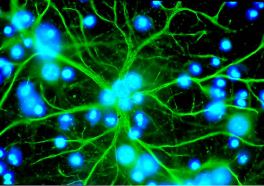NeuroVentures: the emerging neuro-economy
 On Seattle’s First Hill, at the Virginia Mason Neuroscience Institute, a 70-year-old Lou Gehrig’s patient is “banking” her voice so that once the disease takes away her ability to speak she can use her eyes to prompt a computer system to speak for her. A few blocks away, University of Washington spinout Impel Neuropharma recently completed a successful human trial of a device that delivers drugs from the nose directly to the brain to treat central nervous system disorders. And across town, UW scientists have developed a way for people who use cochlear implants to process the sounds of musical melodies and notes.
On Seattle’s First Hill, at the Virginia Mason Neuroscience Institute, a 70-year-old Lou Gehrig’s patient is “banking” her voice so that once the disease takes away her ability to speak she can use her eyes to prompt a computer system to speak for her. A few blocks away, University of Washington spinout Impel Neuropharma recently completed a successful human trial of a device that delivers drugs from the nose directly to the brain to treat central nervous system disorders. And across town, UW scientists have developed a way for people who use cochlear implants to process the sounds of musical melodies and notes.
Neuroscience is a rapidly developing cluster in Seattle, and the driving force behind “NeuroVentures,” a new entrepreneurship course that hopes to capitalize on advances in neuro-fields, from biotech and medicine to law and advocacy, and train entrepreneurs for the emerging neuro-economy. The course, taught by Sam Browd, attending neurosurgeon at Seattle Children’s Hospital and Harborview Medical Center, and faculty at the UW Medical Center, will teach graduate students in engineering, neuroscience, medicine, health sciences, business, and education how to take the technologies they’re developing in school and turn them into successful ventures.
“I’m incredibly excited to be the course director for NeuroVentures,” says Browd, who will be joined by an “all-star lineup of the who’s who in biomedical entrepreneurship from Seattle and around the country,”—guest speakers like Craig Sherman, partner at Wilson Sonsini, Michael Hite, CEO of Impel Neuropharma, and Lance Stewart, senior director of alliances at the Allen Institute for Brain Science. “Our goal is to provide a roadmap from idea to funded company,” Browd explains. Course lectures will cover every aspect of neuro-related entrepreneurship, from intellectual property and conflict of interest to marketing and competitive analysis.
But the class isn’t simply a lecture series. As any good entrepreneur knows, the way to gain experience is to start something. To that end, students from various disciplines will form teams and collaborate to develop their ideas, research the competition, develop a business model, and construct an executive summary of their neuro-related start-up. The experience could give these entrepreneurial students a leg up in the annual UW Business Plan Competition. It will also prepare them for real-world entrepreneurship. Equipped with the necessary skills, NeuroVentures students might just go on to form companies that address autism, Alzheimer’s, sports concussions, or PTSD.
NeuroVentures is offered starting in Winter Quarter 2014.
